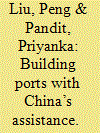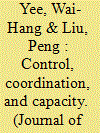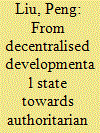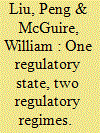|
|
|
Sort Order |
|
|
|
Items / Page
|
|
|
|
|
|
|
| Srl | Item |
| 1 |
ID:
162740


|
|
|
|
|
| Summary/Abstract |
China’s port development projects at home and abroad has generated much discussion among the scholars and policymakers. Since 5 of the top 10 container ports in the world are in mainland China and its shipping companies carry more cargo than those of any other nation, it points to the port efficiency and maritime infrastructure that China has developed in the recent years. However, some of China’s port development activities abroad have been subject of controversy pertaining to its intentions around these projects. In this backdrop, the paper seeks to analyse China’s port development initiatives from littoral countries’ perspective, given their critical dependence on ports such that the level of port efficiency affects the economic growth of the region. The study takes Bangladesh’s port development projects as an example to indicate the opportunities and challenges involved in such initiatives and the need to continue with port development program in a win-win cooperative framework.
|
|
|
|
|
|
|
|
|
|
|
|
|
|
|
|
| 2 |
ID:
172246


|
|
|
|
|
| Summary/Abstract |
Has the establishment of the China Food and Drug Administration in 2013 and the substantial revision of the Food Safety Law in 2015 addressed earlier implementation deficits in China’s food safety policy? Through a comprehensive literature review and series of in-depth interviews with local regulatory officials in Beijing, this study observed improvements in the frontline regulatory system regarding its adherence to regulations, corruption prevention, and citizen responsiveness. However, it also found that the system’s professional capacities were found vastly insufficient for its expanded regulatory scope. Also, frequent abuses of the citizen-complaint system added significantly to the already heavy workload. While better agency collaboration was reported at the subdistrict/township level, coordination with other related functional ministries and geographical regions remained inadequate. The findings provide a needed guide for future reforms.
|
|
|
|
|
|
|
|
|
|
|
|
|
|
|
|
| 3 |
ID:
095193


|
|
|
|
|
| Publication |
2010.
|
| Summary/Abstract |
This paper attempts to answer three questions about the contemporary Chinese drug safety regulation system: why did the Chinese government reform its drug safety monitoring system and build a regulatory regime at the end of the 1990s? What obstacles will it face? What unique characteristics does it possess? Was it the collapse of the Interest Community of Government, Enterprise and Shiye Unit (ICGES) that fostered the rise of the regulatory regime in contemporary China's drug safety monitoring field? Three major structural obstacles threaten the building of a high-quality regulatory regime: problematic regulatory independence caused by decentralised developmentalism, an administration-reliant regulatory style and rent-seeking corruption brought about by the authoritarian political system. The author is inclined to characterise the current Chinese drug safety regulatory regime as an "authoritarian regulatory state" and argues that Chinese drug safety regulatory regime-building is still a work in progress.
|
|
|
|
|
|
|
|
|
|
|
|
|
|
|
|
| 4 |
ID:
137367


|
|
|
|
|
| Summary/Abstract |
As China proceeds with a process of urbanization unprecedented in human history, it maintains an urban-biased governance regime in many areas, including food safety regulation. Using secondary data and interviews with officials from the Changping district in Beijing, this article systematically defines the main characteristics of China's dual food safety regulation regimes, highlighting differences between urban and rural areas in four dimensions: policy structure, funding source, staff structure and resource allocation. This article also provides an explanatory framework to understand this dual regime's development and persistence from a neo-institutionalism perspective. Three main explanatory variables are advanced: historical legacy, dual incentive structures, and dual economic and industrial patterns. While China's urbanization process and governance structure, including the food safety regulatory regime, are not complete by Western standards, we emphasize this problem is best understood by examining China's unique socioeconomic and cultural context.
|
|
|
|
|
|
|
|
|
|
|
|
|
|
|
|
| 5 |
ID:
134881


|
|
|
|
|
| Summary/Abstract |
China's food safety system is characterized by widespread under-enforcement of regulations punctuated by high-profile food safety scandals. While there has been a wave of public and scholarly interest, official data on food safety are scarce, and some fundamental questions remain unanswered. We evaluate the strengths and weaknesses of media-based event data as a source for scholars and policy makers interested in understanding more about China's food safety crisis. While some biases are likely present, we find that the data produce a reasonable set of results: food safety problems are most acute in poor provinces, and where government expenditures are low. Reported food safety incidents also increase with the rate of urbanization, which may reflect the increased complexity of urban food systems or an urban bias in Chinese media. Importantly, our results indicate that media data can be a valid source for scholars interested in studying food safety or other controversial topics in China.
|
|
|
|
|
|
|
|
|
|
|
|
|
|
|
|
|
|
|
|
|